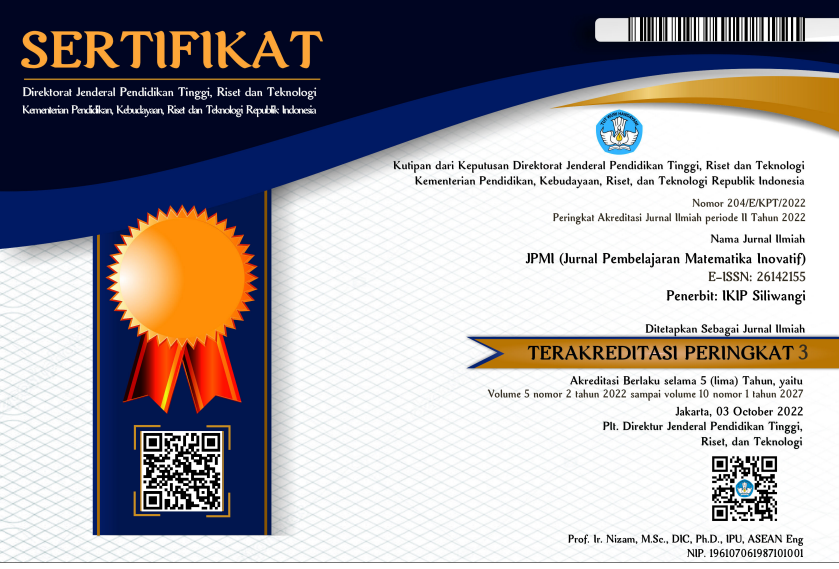Karakteristik kemampuan pemahaman konsep matematis siswa kelas VII MTs
DOI:
https://doi.org/10.22460/jpmi.v6i6.17542Kata Kunci:
Concept Understanding Ability, CharacteristicsAbstrak
One of the goals of learning mathematics is that students can demonstrate an accurate conceptual understanding of problem solving. The research was conducted at one of the MTs in West Bandung Regency. The purpose of this study was to determine the MTs students' understanding of mathematical concepts in fractional material using a qualitative descriptive method. Data collection techniques are conducting written tests, interviews and documentation on class VII students. The written test uses questions that are in accordance with the understanding of mathematical concepts. The characteristics of students' ability to understand mathematical concepts were categorized into 3, namely students who answered correctly (SMT) as many as 5 people (33.3%) on the indicator Presenting models and non-model objects of a concept and expressing concepts in various forms of mathematical descriptions, students who answered incorrectly (SKT) as many as 7 people (46.7%) on the indicator restating objects against a concept and categorizing objects according to their nature according to the concept, and students who did not answer as many as 3 people (20%) on indicators applying a concept or algorithm in problem solving.
Referensi
Arifah, ummi, & Saefudin, abdul azis. (2017). Menumbuhkembangkan kemampuan pemahaman konsep matematika dengan menggunakan model pembelajaran guided discovery. UNION: Jurnal Pendidikan Matematik, , 5(3), 264–271. https://doi.org/10.30738/.v5i3.1251
Aripin, U., & Purwasih, R. (2017). Penerapan pembelajaran berbasis alternative solutions worksheet untuk meningkatkan kemampuan berpikir kreatif matematik. Jurnal Pendidikan Matematika FKIP Univ. Muhammadiyah Metro, 6(2), 225–233. https://doi.org/10.24127/ajpm.v6i2.989
Kartika, Y. (2018). Analisis kemampuan pemahaman konsep matematis peserta didik kelas vii SMP pada materi bentuk aljabar. JurnalPendidikan Tambusai, 2(4), 2614–3097. https://doi.org/10.31004/jptam.v2i4.25
Mawaddah, S., Maryanti, R., Matematika, P., Universitas, F., Mangkurat, L., Brigjen, J., Hasan, H., Kayu, B., & Banjarmasin, T. (2016). Kemampuan pemahaman konsep matematis siswa SMP dalam pembelajaran menggunakan model penemuan terbimbing (Discovery Learning). EDU-MAT Jurnal Pendidikan Matematika, 4(1), 76–85. http://dx.doi.org/10.20527/edumat.v4i1.2292
Mulyati, S., & Evendi, H. (2020). Pembelajaran matematika melalui media game quizizz untuk meningkatkan hasil belajar matematika SMP. GAUSS: Jurnal Pendidikan Matematika, 3(1), 64–73. https://doi.org/10.30656/gauss.v3i1.2127
Nurdin, E., Ma’aruf, A., Amir, Z., Risnawati, R., Noviarni, N., & Azmi, M. P. (2019). Pemanfaatan video pembelajaran berbasis Geogebra untuk meningkatkan kemampuan pemahaman konsep matematis siswa SMK. Jurnal Riset Pendidikan Matematika, 6(1), 87–98. https://doi.org/10.21831/jrpm.v6i1.18421
Putra, H. D., Putri, A., Lathifah, A. N., & Mustika, C. Z. (2018). Kemampuan mengidentifikasi kecukupan data pada masalah matematika dan self-efficacy siswa MTs. JNPM (Jurnal Nasional Pendidikan Matematika), 2(1), 48–61. https://doi.org/10.33603/jnpm.v2i1.862
Putra, H. D., Setiawan, H., Nurdianti, D., Retta, I., & Desi, A. (2018). Kemampuan pemahaman matematis siswa smp di bandung barat. Jurnal Penelitian Dan Pembelajaran Matematika, 11(1), 19–30. https://doi.org/10.30870/jppm.v11i1.2981
Rahayu, Y., & Pujiastuti, H. (2018). Analisis kemampuan pemahaman matematis siswa SMP pada materi himpunan: Studi Kasus di SMP Negeri 1 Cibadak. Symmetry | Pasundan Journal of Research in Mathematics Learning and Education, 3(2), 93–102. https://doi.org/10.23969/symmetry.v3i2.1284
Rosmawati, R. R., & Sritresna, T. (2021). Kemampuan pemahaman konsep matematis ditinjau dari self-confidence siswa pada materi aljabar dengan menggunakan pembelajaran daring. Jurnal Pendidikan matematika, 1(1), 275-290. https://doi.org/10.31980/plusminus.v1i2.1261
Santosa, F. H., & Bahri, S. (2020). Karakteristik pemahaman matematis berdasarkan kemampuan awal matematis siswa. Jurnal Pemikiran Dan Penelitian Pendidikan Matematika, 3(2), 91–104. http://journal.rekarta.co.id/index.php/jp3m/article/view/233/231
Sari, W. N., Surmilasari, N., & Fakhrudin, A. (2022). Analisis kemampuan pemahaman konsep pada materi pecahan siswa kelas IV SDNegeri95 Palembang. Journal on Teacher Education, 4(2), 630–639. https://doi.org/10.31004/jote.v4i2.8453
Sarwoedi, Marinka, D. O., Febriani, F., & Wirne, I. nyoman. (2018). Efektifitas etnomatematika dalam meningkatkan kemampuan pemahaman matematika siswa. Jurnal Pendidikan Matematika Raflesia, 3(2), 171–176. https://ejournal.unib.ac.id/jpmr/article/view/7521/3733
Sugandi, asep I., & Benard, M. (2018). Penerapan pendekatan kontekstual terhadap kemampuan pemahaman dan komunikasi matematis siswa SMP. Jurnal Analisa , 4(1), 16–23. http://journal.uinsgd.ac.id/index.php/analisa/index
Unaenah, E., Nurfaizah, A., Safitri, D., Rahmawati, N., Siti, R., Fatimah, N., Adinda, A. P., & Tangerang, U. M. (2020). Meningkatkan kemampuan pemahaman konsep pecahan sederhana melalui media CD. Jurnal Pendidikan Dan Dakwah, 2(2), 303–318. https://ejournal.stitpn.ac.id/index.php/pandawa
Unaenah, E., Sumantri, M. S., Studi, P., Guru, P., Dasar, S., Tangerang, U. M., & Jakarta, U. N. (2019). Analisis pemahaman konsep matematis siswa kelas 5 sekolah dasar pada materi pecahan. Jurnal Basicedu , 3(1), 106–111. https://jbasic.org/index.php/basicedu
Yulianty, N. (2019). Kemampuan pemahaman konsep matematika siswa dengan pendekatan pembelajaran matematika realistik. Jurnal Pendidikan Matematika Raflesia, 04(01), 60–65. https://ejournal.unib.ac.id/index.php/jpmr
Unduhan
Diterbitkan
Terbitan
Bagian
Lisensi
Hak Cipta (c) 2024 JPMI (Jurnal Pembelajaran Matematika Inovatif)

Artikel ini berlisensiCreative Commons Attribution-ShareAlike 4.0 International License.
The author is responsible for acquiring the permission(s) to reproduce any copyrighted figures, tables, data, or text that are being used in the submitted paper. Authors should note that text quotations of more than 250 words from a published or copyrighted work will require grant of permission from the original publisher to reprint. The written permission letter(s) must be submitted together with the manuscript.
















